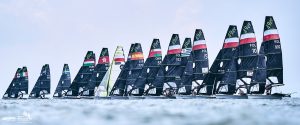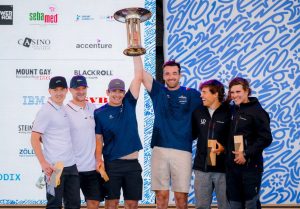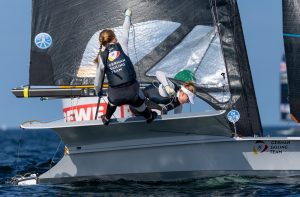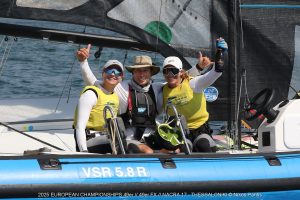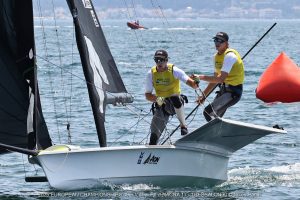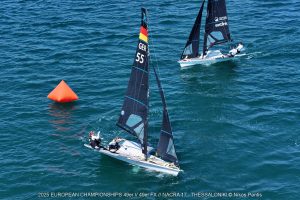Day 2 – Intergalactic Championship in Rio
Fantastic Conditions
The sea breeze kicked in early on the Olympic waters of Rio. By the 1:00 pm start line 10-14 knots of wind filled the Olympic race course and the days racing started on time. More than half of the worlds top 10 49er sailors are racing in the Olympic waters to get used to the conditions here and take a break from of the Northern Hemisphere winter.
The teams started the day optimistic of learning more and gaining an advantage on those teams who opted to train elsewhere in the world this winter. There was no consensus on what the best route to the windward mark would be when the day started.
Perfect Storm Ruins Course
Overnight a massive storm system enveloped Rio and dumped inches of rain all through the city over the course of 3 hours. Flooding through the streets funnels litter and trash from all over the city into Guanabara Bay. The 16 million inhabitants of Rio live in high density with variable access to garbage disposal services. Even in the cleanest and more organized city, a strong rain storm can upset coastal waterways, but with a huge city like Rio, the effect is ruinous.
Contributing to the problem sailors faced while racing is the flood tide. For most of the morning the water flowed out of Guanabara Bay so that by race time trash was all over the race area. Marco Grael, who has been sailing here his whole life and is competing for a spot on the Brazilian teams says things are getting worse. “Only 10 years ago, the trash would get washed out to sea and green ocean water would replace it. Now that’s not happening as much and the garbage is getting concentrated and building up making the sailing conditions worse year on year.”
Bronze Medalist Drops From the Lead
Alan Norregaard, Bronze medalist from London 2012, was one of the worst effected sailors on the day. During race 2 on the day, he went head to head with series leader Nico Delle Karth of Austria. These two sailors drag raced heads up to the favored left side of the course, and after almost 8 minutes Alan had brokered a tenuous lead. Disaster struck, and Alan, with crew Anders Thomsen ran over a plastic bag that got stuck onto his centerboard. Any item stopping the flow of water flowing over this underwater wing disturbs a sailors, but a large plastic bag renders racing impossible. The Danish duo were forced to stop there boat and reverse it on the racecourse so the bag would float off the front of the board. By the time they got racing again they went from the lead to second last, and their chances of taking some points from the Austrians was gone.
“This is unacceptable as an Olympic venue right now. They either need to clean it up or move the venue so we sail outside on the ocean and away from the city,” said Alan.
The sailors are aware that all the Olympic partners, the City of Rio, the IOC, and ISAF are doing all they can to improve the situation.
Sewage and Garbage
On top of the garbage situation is a well publicized sewage problem for all the water sportsmen of the Rio Olympics. The water quality levels are 186 times worse than allowable and sailors, rowers, ocean swimmers, paddlers, and triathlete are expected to turn a blind eye. The local NGO, MeuRio, has organized for the world press to decent on our fleet of Olympians Saturday to get the real story. The water authority in Rio has no public oversight, and MeiRio are mounting protests at all pre-Olympic events held in Rio in attempt to change the way the water authority is held to account.
As any city planner will tell you, there is no easy fix for the sewage problem. Financing the building water treatment plants and piping to the ocean is no small matter but that task pales in comparison to the cost and complication involved with hooking up the millions of dwelling and shanties that 16 million inhabitants of this fantastic city call home. There is president for good things happening. The great lakes of North America were some of the most polluted in the world only 30 years ago. After fantastic cooperation from both sides of the Canadian/American border the lakes are now in fantastic condition. These waters hold some of the best regattas, like the Chicago to Macinaw ‘long distance’ race and Cork’s freshwater sailing capital regattas.
Fishing For Trash
Back on shore after racing, the fleet laughed collectively at the various pieces of household goods and otherwise they managed to collect on their boats throughout the day. The German team HP Sailing found a Timberland shoe stuck on their board and claimed the odds of being able to stick a shoe on the knife edge front of a board must be one in a hundred. Not to be outdone, the Irish found a purple flip flop, ladies underwear, and a milk carton, along with the usual plastic bags. Bringing it down to toilet humor were the brits Dave Evans and Ed Pows who had to remove a diaper from their rudder through the day. Nobody could match Frances Peters and Nicola Groves who collided with a stop sign, literally stopping them in their tracks.
Austrians on Fire… not literally
Back to racing, it’s the Austrian pairing that has been sailing really well through two days of the regatta. They continue to be the fastest and are consistently placing their boat in the favored locations. They have spent the most time here of any team so far, and maintain a balance between playing the current and observing the wind conditions to ensure they are well placed to win.
In the 49erFX fleet, it’s Charlotte Dobson and Sophie Ainsworth that have maintained their slight lead over countrywomen Frances Peters and Nicola Groves. Local favorites and World Championship silver medalists, Martine Grael and Kahena Kunze find themselves just off the pace and will need to pick up their game if they hope to overtake the british pairs.


